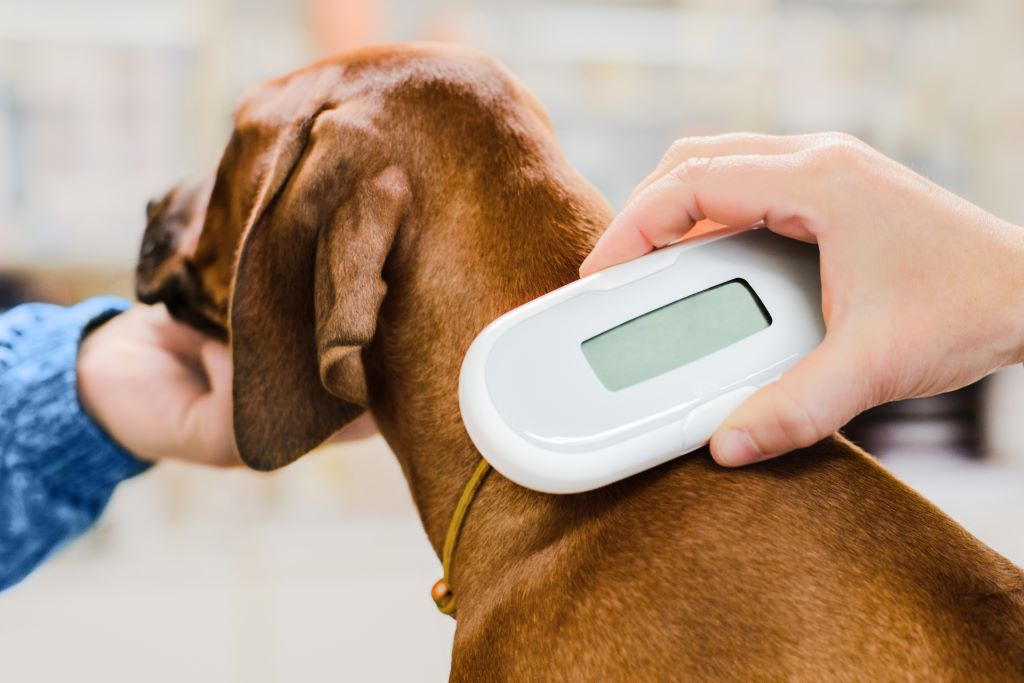Microchipping Your Dog or Cat
The peace of mind that you get from microchipping your pet is immeasurable

Microchipping is a smart, easy way to keep pet owners and their pets in close contact. Veterinary offices and animal shelters highly recommend microchipping both cats and dogs (any animal that can run away or get stolen).
In case you're unfamiliar, microchipping is the process of inserting a very small electronic microchip implant under the skin of an animal. This chip is about the size of a grain of rice and provides a permanent ID for a pet. There are virtually no downsides to getting a pet microchipped, but there are countless upsides. Read on to learn more about microchipping, as well as the top three benefits of microchipping your pet.
How does a microchip work?
A microchip for pets contains important personal data with a unique ID number that links each pet back to his or her owner. Microchips are read by special scanners in veterinary offices or animal shelters, and then the microchip number can be looked up in an online database. Microchips only work, however, if the pet owner registers the unique ID online in a microchip registry, such as HomeAgain, AKC Reunite or 24PetWatch. Ask your veterinarian for his or her best recommendations for microchip registries.
How is a microchip inserted?
A pet's microchip is placed under his or her skin between the shoulder blades (at the back of your pet's neck) by a veterinarian. Typically, a hypodermic needle is used to implant the microchip. Anesthesia is not necessary.
Does microchipping hurt pets?
It is generally believed that inserting a microchip in an animal is about as painful as a typical vaccination. Most pets won't even notice the implantation of the microchip.
How much does microchipping cost?
Microchipping can cost anywhere from $15 to $50. Some microchip companies have annual fees and others don't. Either way, it's a small price to pay for the reassurance that your pet can easily be reconnected with you if he or she gets away!
Benefits of microchipping a pet
There are countless benefits of microchipping your pet. Here are the top three.
-
Microchips help locate pets if they run away.
Let's say your pet runs away or somehow gets separated from you. It's easy for him to dart if the gate is accidentally left open or make a break for it as you're bringing in the groceries. If he or she ends up at a veterinary office or animal shelter, there's a good chance that the staff will scan your pet for a microchip. If one is found, then your pet will soon be safely returned to you.
-
Microchips help find stolen pets.
It's a sad reality to face, but "dognapping" is real. Some people steal pets in an effort to sell the animal for a profit. Without a microchip, proof of ownership can be a challenge. Having a microchipped pet, on the other hand, can make it easier to track them down if they get stolen -- and then it identifies you as the pet's real parent.
-
Microchips never expire.
Microchip technology is designed to last throughout a pet's life. Microchips also feature an anti-migration feature that helps ensure that the chip stays where it's implanted. It will never need to be replaced. It's in there for life!
If you're ever concerned about your pet's microchip, simply ask your veterinarian to scan it at your pet's next checkup.
Is microchipping a standard practice now?
Generally speaking, yes. Microchipping pets has become a standard practice for many veterinarians and animal shelters.
A few final notes
Before you call your veterinarian to get your pet microchipped, there are a few final things to note.
- Even though microchipping has countless benefits, it doesn't negate the importance of your pet wearing a collar with tags. Having both can only help in an emergency. You should also consider a lost pet recovery service, such as ThePetTag, as another layer of protection.
- A microchip is not a GPS or a tracking device. Instead, microchips are radio-frequency identification (RFID) implants that serve as a pet's permanent ID. This means that, if your pet gets lost and has a microchip, there is no way to track his or her whereabouts. The microchip only helps if someone finds your lost pet and is able to scan for the chip and then contact you for a reunion.
- Microchips only work properly when the microchip is registered in a database with your correct contact information. This ensures that you can be contacted when your lost pet is found. It's also very important to keep your contact information in the database up to date whenever you move or change phone numbers. If a veterinarian office or animal shelter scans for a chip and it's not registered to anyone or the information on file isn't current, then they have to contact the chip manufacturer and ask to whom the chip was sold. Sometimes this is successful, but sometimes it leads to a dead end. Be sure to keep your current contact information on file to avoid this.
Ready to get your pet microchipped?
Sadly, many pets get separated from their owners every day. Thousands of lost pets end up in animal shelters because they somehow got away from home. Without a microchip, only 15% of dogs are reunited with their original owners. However, dogs with microchips are reunited with their owners 52% of the time. Microchips are very successful in cats too. Less than 2% of cats without a microchip are ever returned home. With a microchip, that number jumps to 40%.
If you adopted your pet from a shelter or bought him or her from a breeder, your pet may already have a microchip. To check, be sure to have your pet scanned for a microchip at your next vet visit.
If you're sold on microchipping, simply contact your veterinarian to set up an appointment to get it done. The peace of mind that microchipping gives is immeasurable!
Ready to start saving money on pet wellness care?
Then take a look at Mint Wellness, the pet wellness plan that provides fast reimbursement on routine pet care. Save on vaccinations, wellness exams, preventatives, dental, and more!
Learn More


